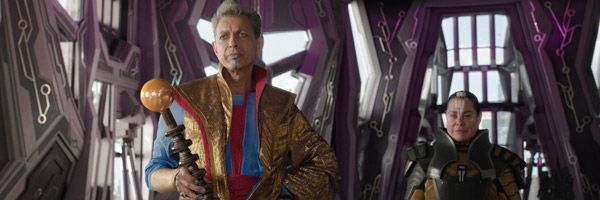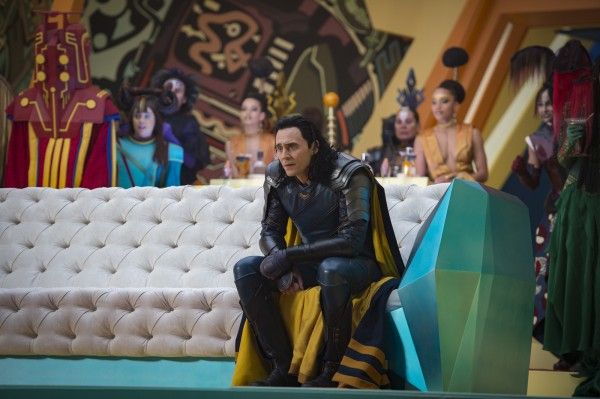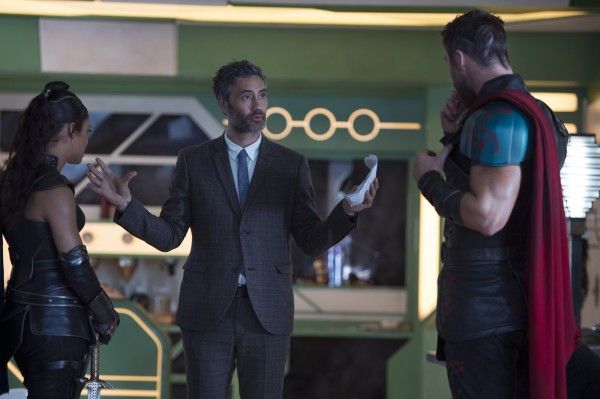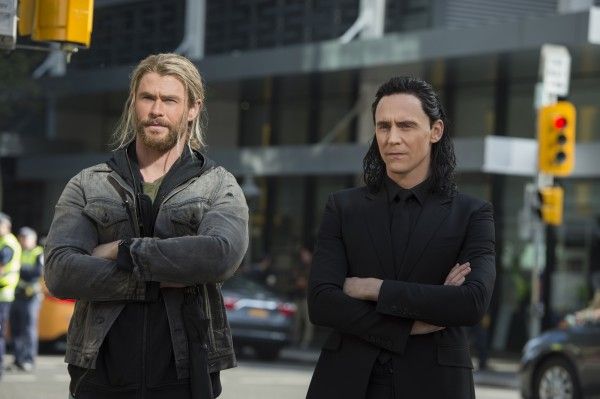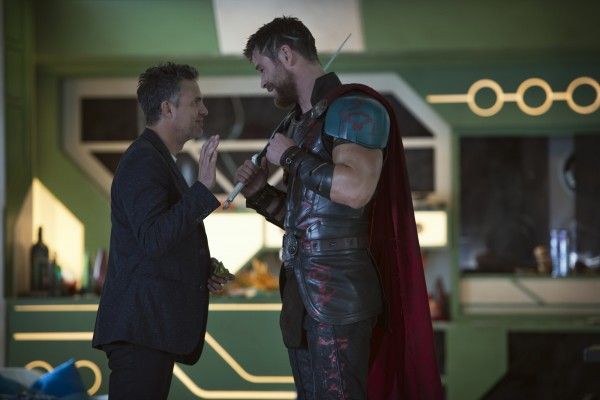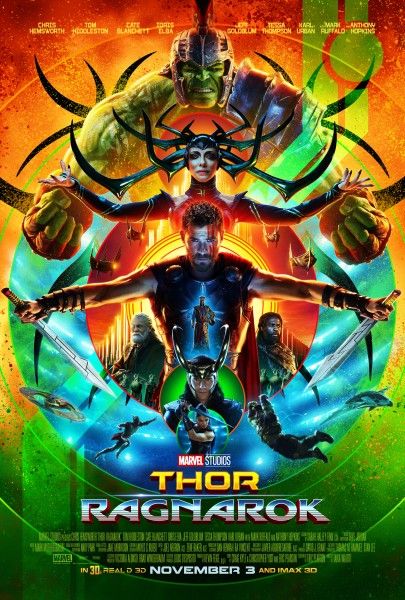Along with the hilarious moments, heartfelt character interaction and big action sequences, one of the most memorable aspects of Thor: Ragnarok is the musical score, from composer Mark Mothersbaugh. The creator of the band DEVO has spent years scoring everything from Pee-Wee’s Playhouse and Rugrats to The LEGO Movie and multiple films for Wes Anderson, before jumping into the Marvel Cinematic Universe and leaving his own stamp of creativity on the world of Thor, for director Taika Waititi.
During a press day at Marvel Studios to discuss some of the behind-the-scenes aspects of the Thor world, Collider got the opportunity to sit down with Thor: Ragnarok composer Mark Mothersbaugh for this 1-on-1 interview about how he got into composing music for film and TV, what attracts him to a project, how he first became aware of the work of Taika Waititi, that the original script was even wilder than the finished film, how Marvel is different from other movie studios, and whether he’d be game to work with Marvel again.
Collider: People are really loving this movie, and one of the things that almost everyone is citing as one of the major stand-outs is your score.
MARK MOTHERSBAUGH: Oh, wow, that’s great!
What’s it like to hear that people are noticing and talking about how great the score is?
MOTHERSBAUGH: Well, I’ve had worse things happen in my career! It’s not so bad. It’s very nice ‘cause lots of times, people don’t even notice the score. You’re going, “I saved this movie’s butt!,” but nobody knows that.
You’ve been pretty busy, as a composer, and you’re all over the map with projects, from live-action to animation to LEGO movies, and you work in film and TV and in video games. Has that been very intentional?
MOTHERSBAUGH: Yeah! I was in a band (DEVO). I was a visual artist, and then I got in a band and we had a lifespan. When it started to fizzle out, my friend Paul Reubens called up and said, “Would you score my TV show?,” and I did. I’ve been writing 12 songs, you rehearse and record them, you rehearse a show, make a video, go out on tour for a year, and then you come back and write 12 more songs the next year. We did that for five albums. When I started doing Pee-Wee’s Playhouse, they sent me a tape on Monday, I wrote 12 songs on Tuesday, I recorded them on Wednesday, and then I mailed them back to New York on Thursday ‘cause I was [in L.A.] and there were no internet transfers in those days. On Friday, they mixed them into the show, on Saturday, I watched it on TV, and on Monday, they’d send me another tape. The cycle of one year got reduced down to one week, and I said, “Sign me up for this job!” I became totally excited about working in film and TV, and that’s how it started.
What gets you to say yes to a project? Do you have to just feel like you have something to bring, musically, to the story that’s being told, or is it about who you’ll be working and collaborating with?
MOTHERSBAUGH: Any of those things could be what make you interested in something. It could be something that appeals to you on all different kinds of levels. Animation is usually easy for me because I love animation and I love cartoons. This film, particularly, what happened was that the timing was just right. I went and saw a movie called Hunt for the Wilderpeople, and I was blown away with the musical choices juxtaposed against the visuals, where the visuals were so lush and green and the music was all ‘70s French minimalist arpeggiated music. I was like, “Who would think of that?! That’s a really brilliant idea!” It made me curious because I’d seen the vampire movie (What We Do in the Shadows) that he was in. At the time, I remember thinking, “This is like a New Zealand version of Wes Anderson,” who I’d done five movies with. So, a couple weeks later, I get a call and they say, “This director that they’re gonna use for the Thor movie, we gave him a list of all of the composers that have worked with Marvel, and he didn’t want any of them. He wanted to work with you.” I went, “Who is it?” And they said, “Taika.” And I went, “I wanna do it!”
Even before I got a script, I was excited about it. And then, I got a script and it was wild. It was wilder, even, than the film. When I talked to him, he described the movie as, “Well, it’s like Thor and Hulk, in a road movie. It’s like a buddy road movie.” The first thing I saw in my head was Thor and Hulk in a big convertible Cadillac from the ‘60s or ‘70s, driving through New Mexico or something. I immediately liked [Taika]. I love it when creative people are involved in anything in L.A. I like it when the directors are creatives. Maybe their history wasn’t that they had done a whole bunch of commercials, so then they got to do a feature film. Maybe it’s because they did amazing small movies. That’s what happened with [Taika]. So, we hit it off, as much as you can hit it off with him because he’s a very eccentric person. He gave me music mixes of things that he was listening to, and none of them had anything to do with big orchestral music. I was listening to those tapes and going, “How do we bring those ideas into the Marvel world?”
How did you enjoy working with Marvel?
MOTHERSBAUGH: Marvel is this amazing entity. It’s an amazing animal that’s very healthy and that is well thought-out, these characters have been around a long time, and there are people that are invested in them and in the world of Marvel. Little things can scare them off. When I saw the first director’s cut, I knew there were going to be adjustments between Taika and Kevin [Feige] to work out. Having worked with probably every studio in town, Kevin is interesting and atypical, in the sense that he’s so invested, personally, in the projects at Marvel. I was trying to think who else was similar, and it’s probably Pixar. A lot of the studios, the people that are executives are not connected to the creative people, at all. They’re thinking about marketing deals and investments, and stuff like that. [Kevin] is the real deal. I had no opinion about him, whatsoever, when I first started, and he showed up at one of my music meetings, which isn’t typical. The head of the company was sitting there next to me while I was playing sketches for the director. That never happens. The heads of studios goes, “Cobbler, cobble me some music. Go away!” That’s typically the response. But, you could tell that he really took an interest in what was going on.
You’d have to work to mess up Marvel because it’s a well-built machine. They’ve really thought out what they’re doing, and they’re looking for ways to bring in creativity. I thought it was so smart that he hired Taika. I thought that was really a good call on his part. I never saw any arguments, but I did see them trying to figure each other out, and it made the whole thing stronger. Somebody who’s really interested in Taika and maybe even somebody who’s really interested in Marvel might really find it interesting to get to see the first director’s cut that I saw in December, last year. It was quite a bit different from what we ended up with. I don’t think it was as strong a film, but there were some really great, crazy moments that were even crazier than what got in the film. I have to say, it was just a really good experience. A lot of times, you make a movie and you’re like, “Okay, it’s done. Pull the plug on the bathtub.” The experience on this one, for me, was very rewarding. You think you’ve seen everything, and you haven’t. I have a new appreciation for other people in this city that I had never met before.
You’ve worked with some of the same filmmakers quite a few times. Do you see yourself coming back to Marvel, after having had such a good experience?
MOTHERSBAUGH: I would work with everybody [at Marvel] again. I have to say, they were very supportive. The music department, in particular, is atypical, in the sense that I got introduced to the music editor that was going to be working on the film with me, and I just thought he was a company man. About three months into it, he was like, “I’ve got a heads up for you. They’re changing the picture, but before they do, I want them to hear what you’re doing.” He actually cared, and I found that interesting. It turns out that Steve Durkee is kind of the head of the music department. There’s no music department, per se, but he’s the guy highest up. He had his sleeves rolled up and he was in there with me, working on the music. He influenced musical decisions in ways that were really helpful to the film and helpful to me, as a composer, and I like that. You don’t see that too often.
Thor: Ragnarok is now playing in theaters.

